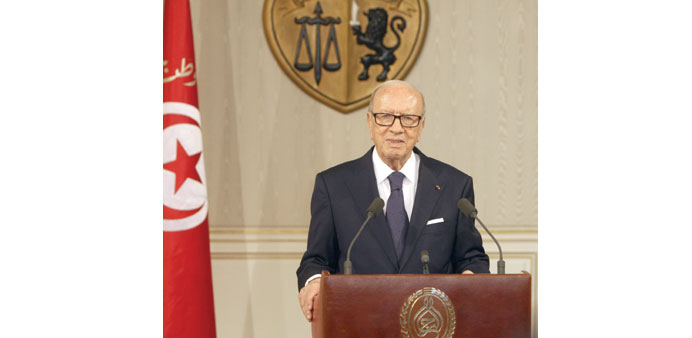Essebsi speaks during a press conference in Tunis yesterday.
Agencies/Tunis
Tunisian President Beji Caid Essebsi declared a state of emergency yesterday, saying the Islamist militant attack on a beach hotel that killed 38 foreigners had left the country “in a state of war”.
In another firm response to the June 26 attack, several officials were sacked including the governor of the Sousse region where it took place.
A Tunisian gunman, said to have been trained in a militant camp across the border in Libya, opened fire killing foreign tourists, mostly Britons, in Port El Kantaoui.
The attack, three months after the deadly Islamist assault on the Bardo museum in Tunis, has shocked the North African country emerging into a democracy following its 2011 Arab Spring uprising.
Tunisia’s emergency laws temporarily give the government more executive flexibility, hand the army and police more authority, and restrict certain rights such as those dealing with public assembly and detention.
“Due to the terrorism risk, and the regional context, and spread of terrorism, we have declared a state of emergency,” Essebsi said in a televised address.
“The continued threat we face leaves the country in a state of war, where we have to use all measures necessary.”
An aide to Tunisia’s prime minister said yesterday that several officials including the Sousse governor and from the assailant’s home town and from where he studied, as well as police officers, had been sacked.
“Just as there have been security failures, there have also been political failures,” the premier’s communications adviser Dhafer Neji said.
The beach massacre struck a huge blow to Tunisia’s tourism industry, prompting thousands of holidaymakers to leave and causing an estimated $500mn in losses for a sector that makes up 7% of the economy.
Authorities have moved to close down 80 mosques they said were operating illegally or spreading extremism which officials say helps recruit young Tunisians to Islamist militancy.
Tunisia last had a state of emergency during the 2011 uprising against autocrat Zine El Abidine Ben Ali. That revolt followed years of upheaval between secular and Islamist parties in one of the Arab world’s most secular countries.
Tunisia has since been hailed as a model of peaceful democratic transition in the region. But it has also struggled with the rise of Islamist movements, some opposed to democracy and bent on violence.

